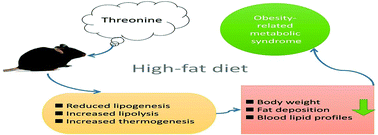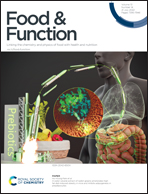Threonine supplementation prevents the development of fat deposition in mice fed a high-fat diet
Abstract
Obesity is the main factor involved in the onset of many diseases. Threonine supplementation has been demonstrated to reduce fat mass and serum triglycerides in already obese mice. However, it is unclear whether threonine could inhibit the development of obesity in mice without previous high-fat diet induction. In the present study, mice were fed a chow diet (CD) or a high-fat diet (HFD), supplemented or not with threonine (3.0% in drinking water) for 15 weeks. Results showed that mice subjected to chronic threonine supplementation showed decreased body weight, epididymal white adipose tissue weight, serum low-density lipoprotein cholesterol, and total cholesterol in comparison with HFD-fed mice. In the epididymal adipose tissue, gene expressions of sterol regulatory element-binding protein 1c and fatty acid synthase were up-regulated, while hormone sensitive lipase, adiponectin and fibroblast growth factor 21 were down-regulated. In the liver tissue, gene expressions of sirtuin1, adenosine monophosphate-activated protein kinase and peroxisome proliferator activated receptor γ co-activator 1α were up-regulated by threonine supplementation in HFD-fed mice. These results suggest that long-term threonine supplementation inhibited fat mass and improved lipid metabolism, making it a potential agent to prevent the development of diet-induced obesity.



 Please wait while we load your content...
Please wait while we load your content...